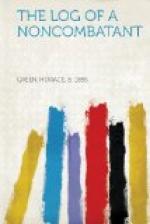“Saw tremendous troop movements along Brussels-Louvain-Verviers line of communication. During the first day thirty-five troop and transport trains went past us, moving towards the western frontier, the larger part to strengthen the German attack on Antwerp, which we had not long left behind us, others to discharge their loads as near as possible to Lille, Tournai, and Mons. The average train was twenty cars long, making about seven hundred carloads, with two hundred or more in each car, giving a total of more than 140,000 fighting men. We stopped counting at the end of the first day.
“After we left Louvain I got out occasionally and stretched my legs along the tracks, but Luther, not being able to talk German, stuck pretty close to his diggings. Had a great time at a little town called Neerwinden, where we stayed about half an hour. A crowd of soldiers from our train joined a group cooking supper in the moonlight at one of the soup kitchens along the tracks. They fed me lukewarm stew and slabs of rye bread, then went on singing and arguing without paying much attention to me. One bald-headed, stocky private told the crowd the news that von Hindenburg had captured Warsaw. Later a crowd of big brutes, apparently pretty drunk, swaggered down and clapped me on the back with a ‘Who are you, my friend?’
“‘Amerikaner,’ I explained, not thinking it necessary to mention the war correspondent part. They set up a cheer, clapped me on the back, and finally lifted me to their shoulders for a triumphal ride up and down the railroad ties, all the time yelling out ’Amerikaner! Hurrah! Amerikaner!’




